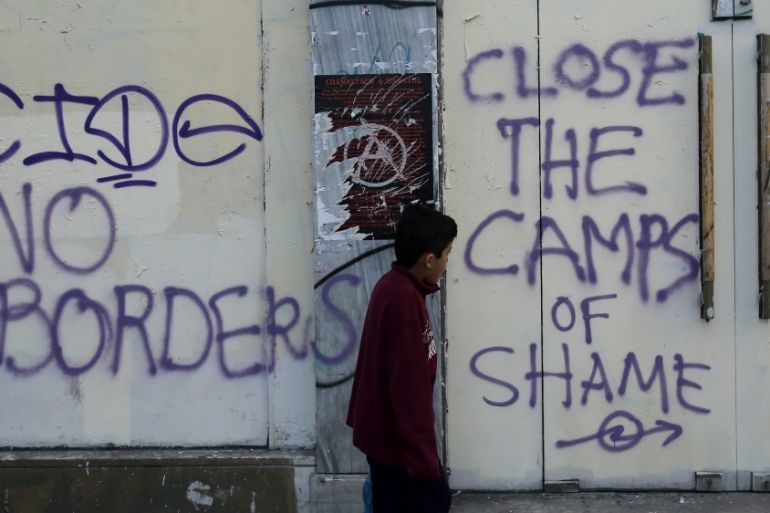Protests in Greece as EU-Turkey refugee deal nears two years
Hundreds rally against 2016 agreement aimed at stemming the flow of refugees and migrants to Europe.

More than a thousand people have rallied in Athens against the March 2016 European Union-Turkey deal to stem the flow of refugees and migrants to the continent.
Refugees, solidarity activists, leftists and anti-fascists marched throughout the Greek capital on Saturday, just three days in advance of the EU-Turkey deal’s second anniversary.
Keep reading
list of 4 itemsBeyond borders: Migrants online
Tunis police raid sees refugees abandoned near the border with Algeria
‘No turning back’: Carnation Revolution divides Portugal again, 50 years on
The rally was as part of the call for protests to mark the International Day for the Elimination of Racial Discrimination, which is commemorated each year on March 21.
“We have called for protests against all of the EU’s deals with countries which were made to return refugees to so-called ‘safe countries’,” Nasim Lomani, an Athens-based activist with the Network of Social Support for Migrants and Refugees, told Al Jazeera.
On Saturday morning, just hours before the rally started, a boat carrying refugees and migrants from Turkey sank near the Greek island of Agathonisi, situated in the eastern Aegean Sea.
The Greek coastguard has found 16 bodies, among them children, so far, but they expect the death toll to increase, according to the Greek daily Ekathimerini.
“This is exactly why it’s important to protest today – Fortress Europe is killing people every day,” Lomani added.
In a press release published on Saturday, Greece‘s migration minister, Dimitris Vitsas, called for a “solution” to the ongoing refugee crisis.
“We can’t tolerate losing children in the Aegean Sea … the solution is to protect people, to implement safe procedures and safe routes for migrants and refugees, to hit the human trafficking circuits,” Vitsas said in the statement, as reported by Ekathimerini.
EU-Turkey deal
Reached in March 2016, the EU-Turkey deal was hailed by its supporters as a landmark agreement.
Critics decried the deal for leaving asylum seekers with few options beyond remaining stranded in Turkey or taking increasingly dangerous routes to Europe.
After the agreement was reached, countries across Eastern Europe sealed their borders, effectively closing the so-called ‘Western Balkans route’ that previously had been widely used by refugees and migrants.
“The protest today is important because the situations in [refugees’ home countries] is getting worse,” Qafar Karimi, a 40-year-old Afghan refugee, told Al Jazeera.
“Our message to the whole world is: Open the borders.”
Karimi added: “Every day, the wars in Syria, Iraq and Afghanistan are getting worse. It’s not fit for living any more, and that’s why we came here. We are refugees from war; we are not economic migrants.”